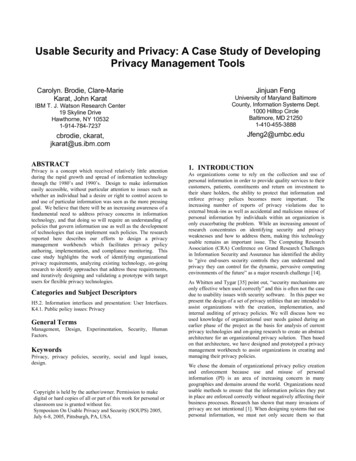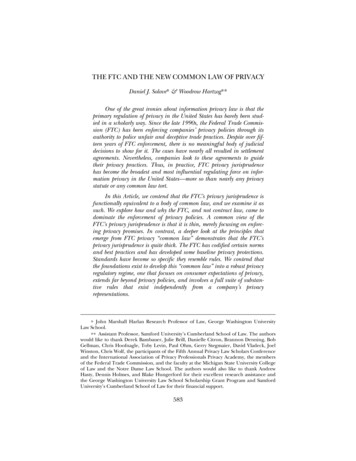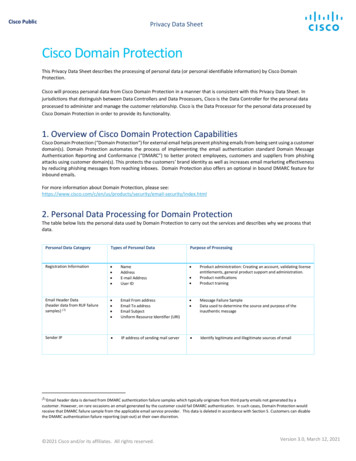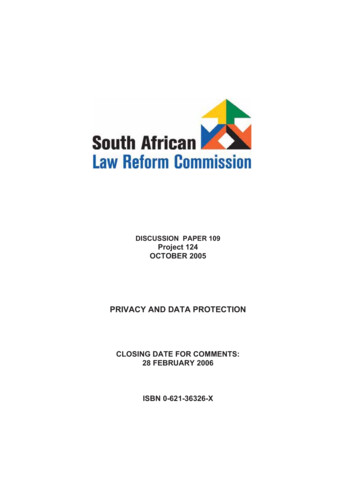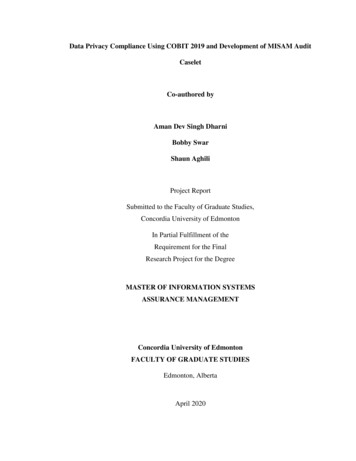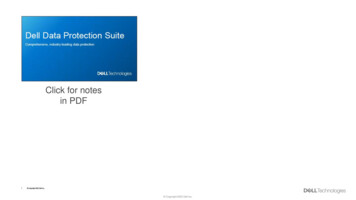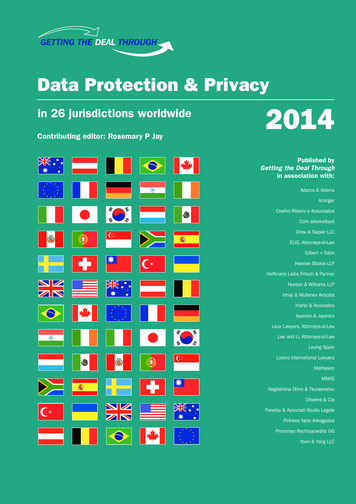
Transcription
Data Protection & Privacyin 26 jurisdictions worldwideContributing editor: Rosemary P Jay2014Published byGetting the Deal Throughin association with:Adams & AdamsArzingerCoelho Ribeiro e AssociadosCom advokatbyråDrew & Napier LLCELIG, Attorneys-at-LawGilbert TobinHeenan Blaikie LLPHoffmann Liebs Fritsch & PartnerHunton & Williams LLPIchay & Mullenex AvocatsIriarte & AsociadosJayaram & JayaramLaux Lawyers, Attorneys-at-LawLee and Li, Attorneys-at-LawLexing SpainLorenz International LawyersMathesonMNKSNagashima Ohno & TsunematsuOlivares & CiaPanetta & Associati Studio LegalePinheiro Neto AdvogadosPreslmayr Rechtsanwälte OGYoon & Yang LLC
contents Data Protection &Privacy 2014Contributing editorRosemary P JayHunton & WilliamsPublisherGideon RobertonBusiness development managersAlan LeeGeorge IngledewDan WhiteAccount managerMegan FriedmanTrainee account managersCady Atkinson, Joseph Rush,Dominique Destrée andEmma ChowdhuryMedia coordinatorParween BainsAdministrative coordinatorSophie HickeyTrainee research coordinatorRobin SynnotMarketing manager (subscriptions)Rachel Nursesubscriptions@gettingthedealthrough.comHead of editorial productionAdam MyersIntroduction Rosemary P Jay Hunton & Williams3EU Overview Rosemary P Jay Hunton & Williams6Australia Peter Leonard and Michael Burnett Gilbert Tobin8Austria Rainer Knyrim Preslmayr Rechtsanwälte OG19Belgium Jan Dhont, David Dumont and Jonathan Guzy Lorenz International Lawyers27Brazil Esther Donio Bellegarde Nunes and Paulo Henrique Bonomo Pinheiro Neto Advogados35Canada Adam Kardash, Joanna Fine and Bridget McIlveen Heenan Blaikie LLP40France Annabelle Richard and Diane Mullenex Ichay & Mullenex Avocats47Germany Peter Huppertz Hoffmann Liebs Fritsch & Partner55India Malavika Jayaram Jayaram & Jayaram62Ireland John O’Connor and Anne-Marie Bohan Matheson73Italy Rocco Panetta and Adriano D’Ottavio Panetta & Associati Studio Legale82Japan Akemi Suzuki Nagashima Ohno & Tsunematsu89Korea Kwang-Wook Lee Yoon & Yang LLC95Luxembourg Gary Cywie MNKS101Mexico Gustavo A Alcocer and Paulina Villaseñor Olivares & Cia108Peru Erick Iriarte Ahon and Cynthia Tellez Iriarte & Asociados113Production coordinatorLydia GergesPortugal Mónica Oliveira Costa Coelho Ribeiro e Associados117Senior production editorJonathan CowieSingapore Lim Chong Kin and Charmian Aw Drew & Napier LLC124South Africa Danie Strachan and André Visser Adams & Adams135Spain Marc Gallardo Lexing Spain145Sweden Henrik Nilsson Com advokatbyrå152Switzerland Christian Laux Laux Lawyers, Attorneys-at-Law159Taiwan Ken-Ying Tseng and Rebecca Hsiao Lee and Li, Attorneys-at-Law166Turkey Gönenç Gürkaynak and İlay Yılmaz ELIG, Attorneys-at-Law172Ukraine Oleksander Plotnikov and Oleksander Zadorozhnyy Arzinger179United Kingdom Rosemary P Jay, Tim Hickman and Naomi McBride Hunton & Williams185United States Lisa J Sotto and Aaron P Simpson Hunton & Williams LLP191SubeditorDavet HylandDirectorCallum CampbellManaging directorRichard DaveyData Protection & Privacy 2014Published byLaw Business Research Ltd87 Lancaster RoadLondon, W11 1QQ, UKTel: 44 20 7908 1188Fax: 44 20 7229 6910 Law Business Research Ltd 2013No photocopying: copyright licencesdo not apply.First published 2012Second editionISSN 2051-1280The information provided in thispublication is general and may not applyin a specific situation. Legal advice shouldalways be sought before taking any legalaction based on the information provided.This information is not intended tocreate, nor does receipt of it constitute, alawyer–client relationship. The publishersand authors accept no responsibility forany acts or omissions contained herein.Although the information provided isaccurate as of September 2013, beadvised that this is a developing area.Printed and distributed byEncompass Print SolutionsTel: 0844 2480 112LawBusinessResearch
Hunton & Williams LLPunited statesUnited StatesLisa J Sotto and Aaron P SimpsonHunton & Williams LLPLaw and the regulatory authority1Legislative frameworkSummarise the legislative framework for the protection of personallyidentifiable information (PII). Does your jurisdiction have a dedicatedlaws allow affected individuals to bring lawsuits to enforce violations of the law.3data protection law? Have any international instruments on privacy orwould such breaches be handled?data protection been adopted in your jurisdiction?The US legislative framework for the protection of PII resembles apatchwork quilt. Unlike other jurisdictions, the US does not havea dedicated data protection law, but instead regulates primarily byindustry, on a sector-by-sector basis. There are numerous sources ofprivacy law in the US, including laws and regulations developed atboth the federal and state levels. These laws and regulations may beenforced by federal and state authorities, and many provide individuals with a private right to bring lawsuits against organisationsthey believe are violating the law.2Data protection authorityWhich authority is responsible for overseeing the data protection law?Describe the powers of the authority.There is no single regulatory authority dedicated to overseeing dataprotection law in the US. At the federal level, the regulatory authority responsible for oversight depends on the law or regulation inquestion. In the financial services context, for example, variousfinancial services regulators (as well as state insurance regulators)have adopted standards pursuant to the Gramm-Leach-Bliley Act(GLB) that dictate how firms subject to their regulation may collect,use and disclose non-public personal information. Similarly, in thehealth-care context, the Department of Health and Human Servicesis responsible for enforcement of the Health Insurance Portabilityand Accountability Act of 1996 (HIPAA) against covered entities.Outside of the regulated industries context, the Federal TradeCommission (FTC) is the primary federal privacy regulator in theUS. Section 5 of the FTC Act, which is a general consumer protection law that prohibits ‘unfair or deceptive acts or practices inor affecting commerce,’ is the FTC’s primary enforcement tool inthe privacy arena. The FTC has used its authority under section 5to bring numerous privacy enforcement actions for a wide-rangeof alleged violations by entities whose information practices havebeen deemed ‘deceptive’ or ‘unfair.’ Although section 5 does not givethe FTC fining authority, it does enable the Commission to bringenforcement actions against alleged violators, and these enforcement actions typically have resulted in consent decrees that prohibitthe company from future misconduct and often require audits biennially for up to 20 years. Under section 5, the FTC is able to finebusinesses that have violated a consent decree.At the state level, attorneys general also have the ability to bringenforcement actions for unfair or deceptive trade practices, or toenforce violations of specific state privacy laws. Some state privacywww.gettingthedealthrough.comBreaches of data protectionCan breaches of data protection lead to criminal penalties? HowIn general, violations of federal and state privacy laws lead to civil,not criminal, penalties. The main exceptions are the laws directedat surveillance activities and computer crimes. Violations of thefederal Electronic Communications Privacy Act (ECPA) (which iscomposed of the Wiretap Act, the Stored Communications Act, andthe Pen Register Act) or the Computer Fraud and Abuse Act (CFAA)can lead to criminal sanctions and civil liability. In addition, manystates have enacted surveillance laws that include criminal sanctions,in addition to civil liability, for violations.Outside of the surveillance context, the US Department of Justiceis authorised to criminally prosecute serious HIPAA violations. Incircumstances where an individual knowingly violates restrictionson obtaining and disclosing legally cognisable health information,the DOJ may pursue criminal sanctions.Scope4Exempt sectors and institutionsDoes the data protection law cover all sectors and types oforganisation or are some areas of activity outside its scope?There is no single regulatory authority dedicated to overseeingdata protection law in the US. At the federal level, different privacyrequirements apply to different industry sectors and data processing activities. These laws often are narrowly tailored and addressspecific data uses. For those entities not subject to industry-specificregulatory authority, the FTC has broad enforcement authority atthe federal level, and attorneys general at the state level, to bringenforcement action for unfair or deceptive trade practices in the privacy context.5Communications, marketing and surveillance lawsDoes the data protection law cover interception of communications,electronic marketing or monitoring and surveillance of individuals? Ifnot, list other relevant laws in this regard.Interception of communications is regulated primarily at the federal level by the ECPA, which is composed of the Wiretap Act, theStored Communications Act, and the Pen Register Act. The federalCFAA also prohibits certain surveillance activities, but is focusedprimarily on restricting other computer-related activities pertainingto hacking. At the state level, most states have laws that regulate theinterception of communications.191
united statesThere are only a handful of laws that specifically target the practice of electronic marketing, and the relevant laws are specific to themarketing channel in question.Commercial e-mail is regulated at the federal level by theControlling the Assault of Non-Solicited Pornography andMarketing Act of 2003 (CAN-SPAM). There are also state laws regulating commercial email, but these laws are generally pre-emptedby CAN-SPAM.Telemarketing is regulated at the federal level by the TelephoneConsumer Protection Act of 1991 (TCPA) and the Telemarketingand Consumer Fraud and Abuse Prevention Act, as well as regulations implemented by the FTC and the Federal CommunicationsCommission (FCC). There are also state laws regulating telemarketing activities.Text message marketing is regulated primarily by the TCPA andregulations implemented by the FCC.Fax marketing is regulated by the TCPA, as amended by theJunk Fax Prevention Act of 2005, and state laws.6Other lawsIdentify any further laws or regulations that provide specific dataprotection rules for related areas.In addition to the laws set forth above, there are numerous otherfederal and state laws that address privacy issues, including stateinformation security laws and laws that apply to: consumer report information: Fair Credit Reporting Act(FCRA) and Fair and Accurate Credit Transactions Act of 2003(FACTA); children’s information: Children’s Online Privacy Protection Act(COPPA); driver’s information: Driver’s Privacy Protection Act of 1994(DPPA); video rental records: Video Privacy Protection Act (VPPA); and federal government activities: Privacy Act of 1974.7PII formatsWhat forms of PII are covered by the law?The US does not have a dedicated data protection law. Thus, thedefinition of PII varies depending on the underlying law or regulation. In the state security breach notification law context, for example, the definition of PII generally includes an individual’s nameplus his or her Social Security number, driver’s licence number, orfinancial account number. In other contexts, such as FTC enforcement actions, GLB, or HIPAA, the definition of PII is much broader.Although certain laws apply only to electronic PII, many cover PII inany medium, including hard-copy records.8ExtraterritorialityIs the reach of the law limited to data owners and data processorsestablished or operating in the jurisdiction?As a general matter, the reach of US privacy laws is limited to organisations that are subject to the jurisdiction of US courts as constrainedby constitutional due process considerations. Determinationsregarding such jurisdiction are highly fact-specific and depend onthe details of an organisation’s contacts with the US.9Covered uses of PIIIs all processing or use of PII covered? Is a distinction made betweenthose who control or own PII and those who provide services toowners?Generally, US privacy laws apply to all processing of PII. Thereare no formal designations of ‘controllers’ and ‘processors’ under192Hunton & Williams LLPUS law as there are in the laws of other jurisdictions. There are,however, specific laws that set forth different obligations based onwhether an organisation would be considered a data owner or aservice provider. The most prominent example of this distinction isfound in the US state breach notification laws. Pursuant to theselaws, it is generally the case that the owner of the PII is responsiblefor notifying affected individuals of a breach, whereas a service provider is responsible for informing the data owner that it has suffereda breach affecting the data owner’s data. Once a data owner hasbeen notified of a breach by a service provider, the data owner, notthe service provider, then must notify affected individuals.Legitimate processing of PII10 Legitimate processing – groundsDoes the law require that the holding of PII be legitimised on specificgrounds, for example to meet the owner’s legal obligations or if theindividual has provided consent? Give details.US privacy laws generally do not limit the retention of PII to certain specified grounds. There are, however, laws that may indirectlyaffect an organisation’s ability to retain PII. For example, organisations that are collecting personal information online from Californiaresidents must comply with the California Online Privacy ProtectionAct. Pursuant to this law, and general consumer expectations in theUS, the organisation must provide a privacy notice detailing the PIIthe company collects and how it is used. If the organisation uses thePII in materially different ways than those set forth in the privacynotice without providing notice and obtaining consent for such usesfrom the relevant consumers, these uses would likely be considereda deceptive trade practice under federal and state unfair competitionlaws.11 Legitimate processing – types of dataDoes the law impose more stringent rules for specific types of data?Since the US does not have a dedicated data protection law, there isno singular concept of ‘sensitive data’ that is subject to heightenedstandards. There are, however, certain types of information that generally are subject to more stringent rules, such as:Sensitive data in the security breach notification contextTo the extent an organisation maintains individuals’ names plustheir Social Security numbers, driver’s licence numbers or financialaccount numbers, notification generally is required under state andfederal breach notification laws to the extent the information hasbeen acquired or accessed by an unauthorised third party.Consumer report informationThe FCRA seeks to protect the confidentiality of information bearing on the creditworthiness and standing of consumers. The FCRAlimits the permissible purposes for which reports that contain suchinformation (known as consumer reports) may be disseminated, andconsumer reporting agencies must verify that anyone requesting aconsumer report has a permissible purpose for receiving the report.Background screening informationMany sources of information used in background checks are considered public records in the US, including criminal, civil court, bankruptcy, tax lien, professional licensing, workers’ compensation, anddriving records. The FCRA imposes restrictions on the inclusion ofcertain public records in background screening reports when performed by consumer reporting agencies. Employers also can investigate job applicants and employees using internet search engines,but they must comply with their legal obligations under variouslabour and employment laws to the extent such laws restrict the useof the information. For instance, consideration of factors such asGetting the Deal Through – Data Protection & Privacy 2014
Hunton & Williams LLPunited statesHIPAA specifies permissible uses and disclosures of protected healthinformation (PHI), mandates that HIPAA-covered entities provideindividuals with a privacy notice and other rights, regulates coveredentities’ use of service providers (known as business associates), andsets forth extensive information security safeguards relevant to electronic PHI.a conspicuous privacy notice on their site. The notice must includestatutorily prescribed information, such as the types of personalinformation collected, how the operator will use the personal information, how the operator may disclose the personal information tothird parties, and details regarding a parent’s ability to review theinformation collected about a child and opt out of further information collection and use. In most cases, organisations that collectinformation from children online also must send a direct notice toparents that contains the information set forth above along witha statement that informs parents it intends to collect the personalinformation from their child.Children’s informationFCRA and FACTACOPPA imposes extensive obligations on organisations that collectpersonal information from children under 13 years of age online.COPPA’s purpose is to provide parents and legal guardians greatercontrol over the online collection, retention and disclosure of information about their children.The FCRA, as amended by FACTA, imposes several requirementson consumer reporting agencies to provide consumers with notices,including in the context of written disclosures made to consumersby a consumer reporting agency, identity theft, employment screening, pre-screened offers of credit or insurance, information sharingwith affiliates, and adverse actions taken on the basis of a consumerreport.age, race, religion, disability, or political or union affiliation in making employment decisions can be the basis for a claim of unlawfuldiscrimination under federal or state law.Health informationState Social Security number lawsNumerous state laws impose obligations with respect to the processing of SSNs. These laws generally prohibit: intentionally communicating SSNs to the general public; using SSNs on ID cards required for individuals to receive goodsor services; requiring that SSNs be used in internet transactions unless thetransaction is secure or the SSN is encrypted or redacted; requiring an individual to use an SSN to access a website unlessanother authentication device is also used; and mailing materials with SSNs (subject to certain exceptions).A number of state laws also impose restrictions targeting specificSSN uses.Data handling responsibilities of owners of PII12 NotificationDoes the law require owners of PII to notify individuals whose datathey hold? What must the notice contain and when must it beprovided?For organisations not otherwise subject to specific regulation, theprimary law requiring them to provide a privacy notice to consumers is California’s Online Privacy Protection Act. This law requiresa notice when an organisation collects personal information fromindividuals in the online and mobile contexts. The law requiresorganisations to specify in the notice: the categories of PII collected through the website; the categories of third-party persons or entities with whom theoperator may share the PII; the process an individual must follow to review and requestchanges to any of his or her PII collected online, to the extentsuch a process exists; the process by which consumers who visit the website or onlineservice are notified of material changes to the privacy notice forthat website; and the privacy notice’s effective date.In addition to this California law, there are other federal laws thatrequire a privacy notice to be provided in certain circumstances,such as:GLBFinancial institutions must provide an initial privacy notice to customers by the time the customer relationship is established. If thefinancial institution shares non-public personal information withnon-affiliated third parties outside of an enumerated exception, theentity must provide each relevant customer with an opportunity toopt out of the information sharing. Following this initial notice,financial institutions subject to GLB must provide customers withan annual notice. The annual notice is a copy of the full privacynotice and must be provided to customers each year for as long asthe customer relationship persists. For ‘consumers’ (individuals thathave obtained a financial product or service for personal, family orhousehold purposes but do not have an ongoing, continuing relationship with the financial institution), a notice generally must beprovided before the financial institution shares the individual’s nonpublic personal information with third parties outside of an enumerated exception. A GLB privacy notice must explain what non-publicpersonal information is collected, the types of entities with whomthe information is shared, how the information is used, and how itis protected. The notice also must indicate the consumer’s right toopt out of certain information sharing with non-affiliated parties.In 2006, the federal financial regulators responsible for enforcingprivacy regulations implemented pursuant to GLB released modelforms for financial institutions to use when developing their privacynotices. Financial institutions that use the model form in a mannerconsistent with the regulators’ published instructions are deemedcompliant with the regulation’s notice requirements.HIPAAThe Privacy Rule promulgated pursuant to HIPAA requires coveredentities to provide individuals with a notice of privacy practices. TheRule imposes several content requirements, including: the covered entities’ permissible uses and disclosures of PHI; the individual’s rights with respect to the PHI and how thoserights may be exercised; a list of the covered entity’s statutorily prescribed duties withrespect to the PHI; and contact information for the individual at the covered entityresponsible for addressing complaints regarding the handling ofPHI.COPPAPursuant to the FTC’s Children’s Online Privacy Protection Rule,implemented pursuant to COPPA, operators of websites or onlineservices that are directed to children under 13 years old, or whoknowingly collect information from children online, must providewww.gettingthedealthrough.com193
united states13 Exemption from notificationHunton & Williams LLP16 Amount and duration of data holdingWhen is notice not required (for example, where to give notice wouldDoes the law restrict the amount of PII that may be held or the lengthbe disproportionate or would undermine another public interest)?of time it may be held?Outside of the specifically regulated contexts discussed above, aprivacy notice in the US must only be provided in the context ofcollecting personal information from consumers online. There is norequirement of general application that imposes an obligation onunregulated organisations to provide a privacy notice regarding itsoffline activities with respect to personal information.US privacy laws generally do not impose direct restrictions on anorganisation’s retention of personal information. There are, however, thousands of records retention laws at the federal and statelevel that impose specific obligations on how long an organisationmay (or must) retain records, many of which cover records that contain personal information.14 Control of use17 Finality principleMust owners of PII offer individuals any degree of choice or controlAre the purposes for which PII can be used by owners restricted? Hasover the use of their information? In which circumstances?the ‘finality principle’ been adopted?In the regulated contexts discussed above, individuals are providedwith limited choices regarding the use of their information. Thechoices are dependent upon the underlying law. Under GLB, forexample, customers and consumers have a legal right to opt out ofhaving their non-public personal information shared by a financialinstitution with third parties (outside an enumerated exception).Similarly, under the FCRA, as amended by FACTA, individuals havea right to opt out of having certain consumer report informationshared by a consumer reporting agency with an affiliate, in additionto another opt-out opportunity prior to any use of a broader set ofconsumer report information by an affiliate for marketing reasons.Federal telemarketing laws and the CAN-SPAM Act give individualsthe right to opt out of receiving certain types of communications, asdo similar state laws.In addition, California’s Shine the Light Law requires companiesthat collect personal information from residents of California generally to either provide such individuals with an opportunity to knowwhich third parties the organisation shared California consumers’personal information with for such third parties’ direct marketingpurposes during the preceding calendar year or, alternatively, to givethe individuals the right to opt out of such third-party sharing.As the primary regulator of privacy issues in the US, the FTCperiodically issues guidance on pressing issues. In the FTC’s 2012report entitled ‘Protecting Consumer Privacy in an Era of RapidChange’, the Commission set forth guidance indicating that organisations should provide consumers with choices with regard to usesof personal information that are inconsistent with the context of theinteraction through which the organisation obtained the personalinformation. In circumstances where the use of the information isconsistent with the context of the transaction, the FTC indicatedthat offering such choices is not necessary.15 Data accuracyDoes the law impose standards in relation to the quality, currency andaccuracy of PII?There is no law of general application in the US that imposes standards related to the quality, currency, and accuracy of PII. There arelaws, however, in specific contexts that contain standards intendedto ensure the integrity of personal information maintained by anorganisation. The FCRA, for example, requires users of consumerreports to provide consumers with notices if the user will be taking an adverse action against the consumer based on informationcontained in a consumer report. These adverse action notices mustprovide the consumer with information about the consumer’s rightto obtain a copy of the consumer report used in making the adversedecision and to dispute the accuracy or completeness of the underlying consumer report. Similarly, pursuant to the HIPAA SecurityRule, covered entities must ensure, among other things, the integrityof electronic protected health information (ePHI).194US privacy laws have not specifically adopted the finality principle.As a practical matter, organisations typically describe their uses ofpersonal information collected from consumers in their privacynotices. To the extent an organisation uses the personal informationit collects subject to such a privacy notice for materially differentpurposes than those set forth in the notice, it is likely that such apractice would be considered a deceptive trade practice under federal and state consumer protection laws.18 Use for new purposesIf the finality principle has been adopted, how far does the lawallow for PII to be used for new purposes? Are there exceptions orexclusions from the finality principle?In the US, organisations must use the personal information theycollect in a manner that is consistent with the uses set forth in theprivacy notice. To the extent an organisation would like to usepreviously collected personal information for a materially different purpose, the FTC and state attorneys general would expect theorganisation to first obtain opt-in consent from the consumer forsuch use. Where the privacy notice is required by a statute (eg, anotice to parents pursuant to COPPA), failure to handle the PII asdescribed pursuant to such notice also may constitute a violation ofthe statute.Security obligations19 Security obligationsWhat security obligations are imposed on data owners and entitiesthat process PII on their behalf?Similar to privacy regulation, there is no comprehensive nationalinformation security law in the US. Accordingly, the security obligations that are imposed on data owners and entities that processPII on their behalf depend on the regulatory context. These securityobligations include:GLBThe Safeguards Rule implemented pursuant to GLB requires financial institutions to ‘develop, implement, and maintain a comprehensive information security program’ that contains administrative,technical, and physical safeguards designed to protect the security,confidentiality, and integrity of customer information. The requirements of the Safeguards Rule apply to all non-public personal information in a financial institution’s possession, including informationabout the institution’s customers as well as customers of other financial institutions. Although the Safeguards Rule is not prescriptive innature, it does set forth five key elements of a comprehensive information security programme: designation of one or more employees to coordinate theprogramme; conducting risk assessments;Getting the Deal Through – Data Protection & Privacy 2014
Hunton & Williams LLP i mplementation of safeguards to address risks identified in riskassessments; oversight of service providers; and evaluation and revision of the programme in light of materialchanges to the financial institution’s business.united states r equiring an individual to use an SSN to access a website unlessanother authentication device is also used; and mailing materials with SSNs (subject to certain exceptions).A number of state laws also impose restrictions targeting specificSSN uses.HIPAAThe Security Rule implemented pursuant to HIPAA, which appliesto ePHI, sets forth specific steps that cove
Junk Fax Prevention Act of 2005, and state laws. 6 Other laws Identify any further laws or regulations that provide specific data protection rules for related areas. In addition to the laws set forth above, there are numerous other federal and state laws that address privacy issues, including state
